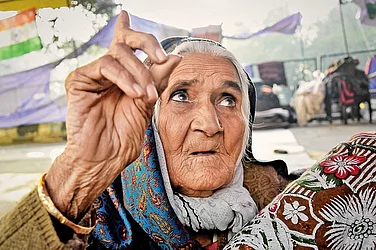At the 2019 iteration of the Toronto -International Film Festival (TIFF), amongst the commercials before the films was one for the in-house endeavour, Share Her Journey, an -attempt to foster gender -equity within the industry, particularly within the ranks of creators. The accompanying grid featured 20 women ambassadors of the effort, and five were either from India or of Indian origin: Priyanka Chopra, Rima Das, -Toronto’s own Deepa Mehta, Mira Nair and documentarian Jennifer Baichwal.
Can You Ms ’Em? Not In Toronto
Indian woman directors are a fixture at this film festival

That outsized female presence, though, wasn’t limited to a single still. Over the past five years, projects from women directors or co-directors have accounted for over half of the films -selected from India for TIFF. In 2019, four films from India arrived at the festival, and three were helmed by women: Geetu Mohandas’s Moothon (The Elder One), Shonali Bose’s The Sky Is Pink and Gitanjali Rao’s Bombay Rose.
Mohandas’s second feature was amongst the path-breaking projects at TIFF 2019. The filmmaker was enthused by the support she -received. “It’s an amazing launch pad and since it is an A-list (festival), the film is noticed. The distribution and networking become a lot easier. There’s also traction back home in terms of media attention. Especially when you’re making an independent film, it’s very important to create a buzz at a festival. TIFF gave me the most amazing platform for that,” she said during the course of an interview.

Rima Das (left) and Geetu Mohandas.
The Elder One is a same-sex romance set in an idyllic village in Lakshadweep. It’s a daring sophomore effort for the actor-turned-director after Liar’s Dice (2013), and if the response to the screening at TIFF was any indication, it will certainly garner attention. After the Q&A session, even as she was being ushered to her car, there were people shouting questions about the premise of the film. It was a movie that TIFF’s co-head and artistic director Cameron Bailey described as a “remarkable accomplishment”. Its narrative encompasses ambiguity of identities and inhabits different worlds—from a serene Arabian seaside -milieu to the violence of Mumbai’s underworld, from a dialect of Malayalam to Mumbaiya trash talk.
Curiously enough, two of the four Indian films at TIFF this year came from Kerala. Apart from The Elder One, there was Lijo Jose Pellissery’s Jallikattu about the mania that seizes a village in its hunt for a buffalo that has escaped slaughter.
If Mohandas was making her TIFF debut, Shonali Bose had arrived at the festival with Amu (2005) and followed it up with Margarita With A Straw (2014). This year, The Sky Is Pink, her latest, was the only Asian film in the showpiece gala section, an accolade the director described as “thrilling”. That Bailey had personally selected each film made her feel “special”. TIFF’s artistic director certainly enjoys Bose’s work: “I just love her filmmaking. She makes deeply human stories, usually about women, and explores aspects of their life that we just don’t see on the big screen often enough.”
That women directors from India dominate screen space at TIFF isn’t a coincidence, but part of the effort to promote such voices. Some, in fact, have gone from TIFF to -national and global acclaim, like Rima Das, who came to the festival in 2017 with Village Rockstars. After that film garnered a National Award for Best Feature, she returned last year with Bulbul Can Sing. As she said last year, “I think if the Village Rockstars was somewhere (else) it might have gotten lost, but it being at TIFF helped us a lot.” Bailey was delighted with the response to that film: “It came to the festival as a small film, made on a very modest budget, set in a fairly remote part of India, and it became such a phenomenon. The audiences loved it.” Das was also at TIFF this year as part of Share Her Journey.
But it’s not as if these films are selected just -because they are by women directors. The filmmakers themselves are uncomfortable with such gendered pigeonholing. But they do tend to get a fairer viewing at TIFF. In 2015, director Leena Yadav, who came to the festival with Parched, quipped, “When I was leaving India, I joked to somebody, ‘The world audience is going to think India is doing a load of women-based stuff.’ I think Cameron Bailey sees these films with a very different sensibility.” As Bailey said, “In the independent sector, over the last three of four years, I’ve seen many more films directed by women, a number of which we’ve shown here. That’s heartening to see.”
These movies are, of course, part of the larger quest for equal screen time. Of the 333 titles at TIFF 2019, 36 per cent were directed, co-directed or created by women, including, fittingly, its longest movie, the 840-minute Women Make Film: A New Road Movie Through Cinema. Joanna Vicente, TIFF’s co-head, pointed out that such women--driven projects accounted for 32 per cent of total submissions, so the selection outpaced those numbers. “We should promote great films but we should also reflect what the world looks like,” she says. “It’s? the natural thing to do.”
***
Wonder Women? At TIFF
2015
- Meghna Gulzar Talvar
- Leena Yadav Parched
2016
- Konkona Sen Sharma A Death In The Gunj
- Khushboo Ranka and Vinay Shukla An Insignificant Man
- Shirley Abraham and Amit Madheshiya The Cinema Travellers
2017
- Rima Das Village Rockstars
- Bornila Chatterjee The Hungry
- Pakhi Tyrewala Pahuna
2018
- Rima Das Bulbul Can Sing
- Nandita Das Manto
- Ritu Sarin and Tenzing Sonam The Sweet Requiem
2019
- Geetu? Mohandas The Elder One
- Shonali Bose? The Sky Is Pink
- Gitanjali Rao Bombay Rose
By Anirudh Bhattacharyya in Toronto















